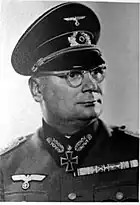Egon von Neindorff | |
|---|---|
 Egon von Neindorff, 1944 | |
| Born | 12 September 1892 Koblenz, Germany |
| Died | 15 April 1944 (aged 51) Tarnopol, Soviet Union |
| Allegiance | |
| Service/ | Army (Wehrmacht) |
| Rank | Major General |
| Commands held | 216th Infantry Division |
| Battles/wars | World War II |
| Awards | Knight's Cross of the Iron Cross with Oak Leaves |
| Relations | Egon von Neindorff (son) |
Egon von Neindorff (12 September 1892 – 15 April 1944) was a German general during World War II. He was a recipient of the Knight's Cross of the Iron Cross with Oak Leaves of Nazi Germany.
World War II
On 1 July 1942 Neindorff took command of Fortress Brigade 1 in Crete. From September 1942 he commanded the 189th Reserve Division, and on 1 December 1942 was promoted to major-general. On 1 May 1943 Neindorff became commander of the 356th Infantry Division in Toulon, on 5 October 1943 he took over command of the 216th Infantry Division in Orel, on 20 October 1943 he commanded the 137th Infantry Division in Gomel, and from 16 December 1943 the 6th Infantry Division south of Gomel. From 17 January 1944 Neindorff led the 36th Infantry Division in Bobruisk.[1][2][3][4]
On 22 January 1944 he became commander of the German garrison at Tarnopol. In March–April 1944, it was encircled by Soviet forces. Hitler had declared Tarnopol a fortified strong point, to be held to the last man. A German relief attempt was mounted on 11 April, but fell short of its goal. Neindorff was killed in action on 15 April; organized resistance quickly collapsed. The garrison of about 4,600 was lost with only 55 men reaching German lines the next day.[5][6]
Awards and decorations
- Iron Cross (1914)
- 2nd Class
- 1st Class
- Clasp to the Iron Cross (1939) 1st Class (2 April 1944)[7]
- Knight's Cross of the Iron Cross with Oak Leaves
- Knight's Cross on 4 April 1944 as Generalmajor and commander of the garrison at Tarnopol[8][9]
- Oak Leaves on 17 April 1944 as Generalmajor and combat commander of Tarnopol[8][10]
References
- ↑ Fellgiebel, Walther-Peer (2000) [1986]. Die Träger des Ritterkreuzes des Eisernen Kreuzes 1939–1945 — Die Inhaber der höchsten Auszeichnung des Zweiten Weltkrieges aller Wehrmachtteile [The Bearers of the Knight's Cross of the Iron Cross 1939–1945 — The Owners of the Highest Award of the Second World War of all Wehrmacht Branches] (in German). Friedberg, Germany: Podzun-Pallas. ISBN 978-3-7909-0284-6.
- ↑ Lehrer, Steven (2002). Hitler Sites: A City-by-city Guidebook (Austria, Germany, France, United States). McFarland. p. 224. ISBN 0-7864-1045-0.
- ↑ Newton, Steven H. (2006). Hitler's Commander: Field Marshal Walter Model – Hitler's Favorite General. Cambridge, MA: Da Capo. ISBN 978-0-306-81399-3.
- ↑ Scherzer, Veit (2007). Die Ritterkreuzträger 1939–1945 Die Inhaber des Ritterkreuzes des Eisernen Kreuzes 1939 von Heer, Luftwaffe, Kriegsmarine, Waffen-SS, Volkssturm sowie mit Deutschland verbündeter Streitkräfte nach den Unterlagen des Bundesarchives [The Knight's Cross Bearers 1939–1945 The Holders of the Knight's Cross of the Iron Cross 1939 by Army, Air Force, Navy, Waffen-SS, Volkssturm and Allied Forces with Germany According to the Documents of the Federal Archives] (in German). Jena, Germany: Scherzers Militaer-Verlag. ISBN 978-3-938845-17-2.
- ↑ Newton 2006, pp. 283–284.
- ↑ Thomas, Franz (1998). Die Eichenlaubträger 1939–1945 Band 2: L–Z [The Oak Leaves Bearers 1939–1945 Volume 2: L–Z] (in German). Osnabrück, Germany: Biblio-Verlag. ISBN 978-3-7648-2300-9.
- ↑ Thomas 1998, p. 114.
- 1 2 Scherzer 2007, p. 564.
- ↑ Fellgiebel 2000, p. 322.
- ↑ Fellgiebel 2000, p. 82.